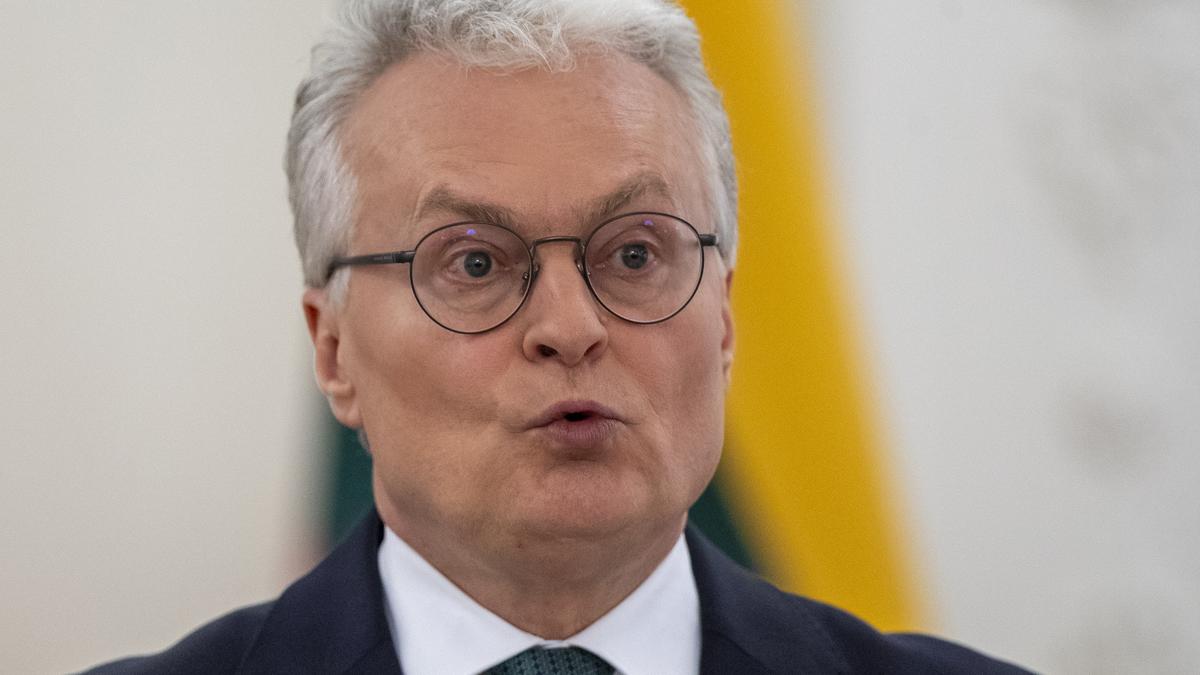
Lithuania holds a Presidential vote as anxieties rise in the Baltics over Russia and war in Ukraine
The Hindu
Lithuania's Presidential election on May 12 amid Russian tensions; incumbent Gitanas Nausėda favored, but runoff likely
Lithuania is holding a Presidential election on May 12 at a time when Russian gains on the battlefield in Ukraine are fueling greater fears across all of Europe about Moscow's intentions, but particularly in the strategically important Baltic region.
The popular incumbent, Gitanas Nausėda, is favored to win another five-year term. But there are eight candidates running in all, making it unlikely that he or any other candidate can win the 50% of the votes needed to win outright on May 12. In that case, a runoff would be held two weeks later on May 26.
The President's main tasks in Lithuania’s political system are overseeing foreign and security policy, and acting as the supreme commander of the armed forces. Those duties and the nation's strategic location along NATO's eastern flank amid a larger geopolitical standoff between Russia and the West add heft to the role despite Lithuania's relatively small size.
There is great concern in Lithuania, and in neighbouring Latvia and Estonia, about Russia's gaining momentum in Ukraine. All three Baltic states declared independence after the collapse of the Soviet Union and took a determined westward course, joining both the European Union and NATO.
Mr. Nausėda, a moderate conservative who turns 60 a week after the election day, has been a strong backer of Ukraine, a position shared across most of the political spectrum. During his time in office, Lithuania has also given refuge to many who have fled an authoritarian crackdown in neighbouring Belarus and increased repression in Russia.
Mr. Nausėda, a former banker who entered politics with his successful presidential run in 2019, is seen as the “safe choice for voters of almost all ideological persuasions," said Tomas Janeliūnas, an analyst at Vilnius University's Institute of International Relations and Political Science.
Polls show that his main opponents are Ignas Vėgėlė, a populist lawyer, who is in second place according to recent opinion polls, and Prime Minister Ingrida Šimonytė, who is in third place in the surveys.

“Writing, in general, is a very solitary process,” says Yauvanika Chopra, Associate Director at The New India Foundation (NIF), which, earlier this year, announced the 12th edition of its NIF Book Fellowships for research and scholarship about Indian history after Independence. While authors, in general, are built for it, it can still get very lonely, says Chopra, pointing out that the fellowship’s community support is as valuable as the monetary benefits it offers. “There is a solid community of NIF fellows, trustees, language experts, jury members, all of whom are incredibly competent,” she says. “They really help make authors feel supported from manuscript to publication, so you never feel like you’re struggling through isolation.”

Several principals of government and private schools in Delhi on Tuesday said the Directorate of Education (DoE) circular from a day earlier, directing schools to conduct classes in ‘hybrid’ mode, had caused confusion regarding day-to-day operations as they did not know how many students would return to school from Wednesday and how would teachers instruct in two modes — online and in person — at once. The DoE circular on Monday had also stated that the option to “exercise online mode of education, wherever available, shall vest with the students and their guardians”. Several schoolteachers also expressed confusion regarding the DoE order. A government schoolteacher said he was unsure of how to cope with the resumption of physical classes, given that the order directing government offices to ensure that 50% of the employees work from home is still in place. On Monday, the Commission for Air Quality Management in the National Capital Region and Adjoining Areas (CAQM) had, on the orders of the Supreme Court, directed schools in Delhi-NCR to shift classes to the hybrid mode, following which the DoE had issued the circular. The court had urged the Centre’s pollution watchdog to consider restarting physical classes due to many students missing out on the mid-day meals and lacking the necessary means to attend classes online. The CAQM had, on November 20, asked schools in Delhi-NCR to shift to the online mode of teaching.









